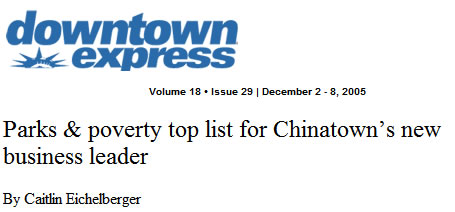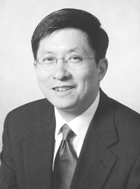
 Wellington Chen, a longtime community advocate, urban planner and urban affairs specialist, was appointed executive director of the Chinatown Partnership Local Development Corporation last Friday. During his tenure at the Partnership, Chen said he expects Chinatown to earn its bragging rights as the greatest Chinatown in the country through stabilizing living conditions, revitalizing business and nurturing culture in the neighborhood.
Wellington Chen, a longtime community advocate, urban planner and urban affairs specialist, was appointed executive director of the Chinatown Partnership Local Development Corporation last Friday. During his tenure at the Partnership, Chen said he expects Chinatown to earn its bragging rights as the greatest Chinatown in the country through stabilizing living conditions, revitalizing business and nurturing culture in the neighborhood.
A resident of one of the city's other Chinatowns, Flushing, Chen, in his early 50's, replaces the Partnership's interim director, Amy Chin, and joins the new L.D.C. at a critical juncture. The Chinatown civic and business group received a 422,000 grant from the American Red Cross Liberty Disaster Relief Fund last month. The grant is slated for use in the planning and redesign of public spaces and important roadways and parks in Chinatown, including Park Row, Chatham Square, Pier 35 and the East River waterfront and James Madison Plaza. Before charging ahead, however, Chen said he wants to revalidate assumptions by establishing an open dialogue with stakeholders.
"I want to make sure what I am doing is actually what people want," said Chen, named for China's first U.N. ambassador, Wellington Koo. "It is very dangerous to assume we know what people want and just go hammering." According to Chen, "everyone is a stakeholder" in the future of Chinatown and Lower Manhattan. "Imagine walking into a job where everybody is your boss," he said.
To Chen, the economic condition of the neighborhood is of great concern. On Friday afternoon, Chen walked along Franklin St. from Tribeca to Chinatown. He described the walk as being "like a ghost town." The neighborhood's phantomlike quality is what makes Chinatown's challenges unique, he said. "There is a hidden Chinatown," Chen said, citing poor living conditions, a steep language barrier and residents' inability to leave the insular community.
Likewise, it is difficult to gauge change. "You cannot tell superficially," he said. "There are a lot of intangibles for Chinatown." For example, he said, the language barrier makes it hard to chart improvement.
Chen is particularly troubled by Chinatown's 19th-century household conditions where the bathtub is in the kitchen and the refrigerator must be carried up six flights of stairs. His wife, Chen joked, has "legs as strong as a horse" after living in a walkup for seven years. Housing is a forte of Chen's. He co-founded Tri-Plus Construction Corporation in 1989, a company dedicated to creating affordable housing in New York City. Chen has also served as vice president of Urban Living, Inc., as well as a member of Community Board 7 in Queens for more than a decade.
Taking the reins of the Partnership, Chen wants to explore what a Chinatown in Manhattan should be in the 21st century. He said his long-term goal is to lay the groundwork. "I would love to lay down invisible guide rails that years after I am gone, my children, and if I am lucky, my grandchildren will say, my grandfather helped make this happen," Chen said drawing on his passion for history by comparing Chinatown's work ahead to the transcontinental railroad.
To the Partnership, Chen brings 10 years of experience as senior consultant and adviser of the Planning Advocacy Group in Flushing. He has been involved in a number of community projects, including the Downtown Flushing revitalization plan. He was also the first Asian-American to sit on the city's Board of Standards and Appeals.
Born in Taiwan, Chen's first job in America was in Chinatown on Canal St. In the summer of 1970, he worked in a factory above a loft packing wigs for shipment. The street, he said, remains as he remembers it. "Canal St. is an example of the struggle of a community like Chinatown," he said. "It shouldn't exist really, because there are no anchor stores. You typically need an anchor, and yet it has no vacancy. It is an example of how an immigrant community has to survive on its own."
That entrepreneurial creativity, Chen said, will work to Chinatown's advantage. The Asian-American immigrant community is "playing catch-up, and we need some helping hands," he said. "That is what I am here for."